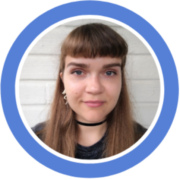Welcome to RUG, Roza!
Roza Weber will be joining the Feringa lab at the University of Groningen in October 2020 as an Early Stage Researcher. In the framework of the ArtMoMa network, Roza will spend 3 years working on Molecular motor-based nanoscale energy storage systems, while participating in international training and network events. Read the following introduction to get to know her.
Tell us more about your background!
I was born in Groningen, the Netherlands in 1998. I obtained my BSc degree in Chemistry from the University of Groningen in 2018, where I worked on the synthesis of organic dyes and the study of their binding to lanthanide nanoparticles for my Bachelor thesis, under the supervision of Prof. Kees Hummelen. In 2018, I moved to Uppsala, Sweden, to begin my MSc studies. I obtained my MSc degree from Uppsala University in Sweden in 2020 after writing my Master thesis on the synthesis and photophysical characterization of luminescent lanthanide complexes under the supervision of Prof. Eszter Borbas.
Why did you want to be a part of ArtMoMa?
First, the project itself made me want to become a part of ArtMoMa. I have been fascinated by the science of molecular machines since I first started studying at the University of Groningen, and I think they have a lot of potential. During my third year at the University of Groningen, I took a course where I did a three-week project under the supervision of a postdoctoral fellow in the Feringa group. This project strengthened my determination to continue my career in organic chemistry research and my interest in molecular machines. I value the creativity, curiosity, and internationality that academic research offers which is not found to the same extent in industry.
What appealed to me about my project specifically was that it involves both synthetic organic chemistry and spectroscopy, two of my favorite disciplines. It also deals with energy storage, an important dilemma in today’s society, which connects the project to my background in Green Chemistry. Additionally, the interdisciplinary nature of ArtMoMa attracted me to the program, which provides an opportunity to further my interests in synthetic chemistry, and study physical phenomena in organic chemistry, which will diversify my portfolio of skills and experience as a researcher in the chemical sciences. It also provides me with great opportunities such as working with and learning from influential scientists across Europe during secondments at several universities and a company.
What are your expectations of living and working in your host city?
Since my host city is also my birthplace, I know what to expect of life as a student there, even though I have not lived there for two years. However, I know that life as a BSc student is not the same as that of a PhD student, and therefore I expect that there will be plenty of new things to discover. Groningen is a great place to live because of its many students, bicycles, and events. I expect that I will see the city in a new light when I move back to the Netherlands and start working there after having lived in Sweden, which has a surprisingly different culture.
What do you think will be your main challenge for you in the next three years?
For a PhD student, many challenges lie ahead, which is part of why it is fun, and such a great learning experience. Personally, I think my main challenge to overcome will be to know how to prioritize. When I am very invested in a (scientific) project, I can lose myself in researching any subject related to the project. For instance, I would constantly think about spectroscopic methods that will help me understand more about the processes that my molecules undergo. However, when one tries to do too many things at the same time without taking a moment to interpret the results when they come in, the chances of overlooking small details increase. During my MSc project, I have learned the importance of taking a moment to consider all the results together, but I look forward to becoming better at it in the future!




